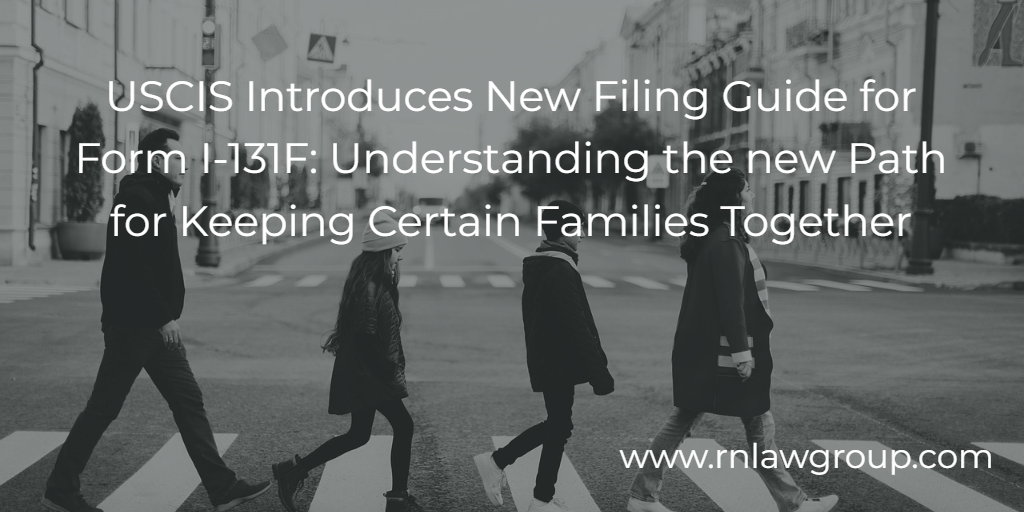
USCIS Introduces New Filing Guide for Form I-131F: Understanding the new Path for Keeping Certain Families Together
In June of this year, the Biden Administration announced that it would create a new program that will allow certain spouses of United States Citizens to apply for parole-in-place. This was done to allow them temporary protections and work permits as well as seek lawful permanent residency without risking a multi-year bar from the country. This program is finally being enacted starting August 19, 2024. The U.S. Citizenship and Immigration Services (USCIS) has recently published a new filing guide for Form I-131F, titled Application for Parole in Place for Certain Noncitizen Spouses and Stepchildren of U.S. Citizens. This guide, as well as the announcement in the Federal Register today, provides detailed guidance to attorneys and families as they prepare to utilize this newly developed program.
Overview of Form I-131F
Form I-131F is designed to allow certain noncitizen spouses and stepchildren of U.S. citizens, who are physically present in the United States without lawful admission or parole, to request a temporary period of parole. This measure is vital for families seeking to remain together while addressing their immigration status.
The application process for Form I-131F must be completed online, and applicants are required to file separate forms for each individual seeking parole. The goal of this new guide is to simplify the process, ensuring applicants are well-informed about the requirements and procedures, thus increasing the likelihood of successful applications.
Eligibility Criteria
To be eligible for parole under Form I-131F, the noncitizen spouse or stepchild must meet specific criteria. Key requirements include:
- Presence in the U.S. without Admission or Parole: The applicant must be in the U.S. without having been lawfully admitted or paroled.
- Continuous Physical Presence: The applicant must have been continuously present in the U.S. since June 17, 2014, for spouses or since June 17, 2024, for stepchildren.
- Legally Valid Marriage: For spouses, the marriage to a U.S. citizen must have been legally valid as of June 17, 2024. For stepchildren, the noncitizen parent must have had a legally valid marriage to a U.S. citizen on or before this date and before the stepchild’s 18th birthday.
- No Disqualifying Criminal History: The applicant must not have any criminal history that would disqualify them from receiving parole.
- No Threat to National Security or Public Safety: USCIS will assess whether the applicant poses any threat to national security or public safety.
Importance of the Filing Guide
The newly published filing guide by USCIS provides a comprehensive roadmap for applicants, detailing the necessary steps to complete Form I-131F successfully. The guide includes essential information on the type of evidence required to demonstrate eligibility, such as:
- Identity Documentation: Applicants must provide a copy of an official photo identity document, such as a government-issued driver’s license or a passport identity page.
- Proof of U.S. Citizenship of Spouse/Stepparent: Applicants must submit evidence that their spouse or stepparent is a U.S. citizen, which can include a U.S. birth certificate, naturalization certificate, or U.S. passport.
- Proof of Relationship: Evidence of the marital or stepchild relationship, such as a marriage certificate or birth certificate, is necessary.
- Evidence of Continuous Physical Presence: Applicants must demonstrate their continuous physical presence in the U.S. since the required dates through various means, including tax returns, school records, or utility bills.
The guide also outlines the information that applicants need to provide about themselves and any preparers or interpreters who assist in completing the form. This includes basic biographical information, Alien Registration Numbers, and any relevant USCIS online account numbers.
Discretionary Nature of Parole
It’s important to note that even if an applicant meets all the criteria outlined in the filing guide, the grant of parole remains at the discretion of USCIS. The guide, and the Federal Register announcement, makes it clear that USCIS may deny the request if it determines that parole is not warranted in a particular case. Factors such as criminal history or issues related to national security can influence the final decision.
For those in removal proceedings or with an order of removal, there remains a possibility of qualifying for parole, though this will be subject to the same rigorous assessment by USCIS.
Additional Considerations and Evidence
Applicants are encouraged to provide any additional evidence that supports their case for parole. This could include documentation that highlights the significant public benefit or urgent humanitarian reasons for granting parole. Such evidence could be crucial in overcoming any rebuttable presumption of ineligibility.
The guide also emphasizes that applicants need to provide evidence regarding any criminal charges or arrests, except for minor traffic violations unless those traffic violations are related to alcohol or drugs. This level of detail ensures that USCIS can fully assess the merits of each application and determine if a favorable use of discretion is warranted.
Impact of the Announcement
The release of this guide is a critical step to follow through on President Biden’s announcement for parole in place for certain individuals. In addition to this guide, DHS has posted a notice in the Federal Register The Federal Register announcement on the “Keeping Families Together” process provides a comprehensive policy backdrop that complements the USCIS guide but also delves into aspects that the guide may not fully explore. For instance, the announcement emphasizes the broad public benefits of the initiative, including the enhancement of national security and economic stability. It outlines how the discretionary nature of parole decisions will be applied, ensuring that only those who truly merit the parole based on individual circumstances receive it. Additionally, the announcement provides a more detailed analysis of the estimated impact, specifying that around 550,000 noncitizen spouses and stepchildren could benefit from this process. This policy framework is crucial for understanding the broader implications of the parole initiative beyond the procedural aspects covered in the USCIS guide.
Conclusion
The publication of the new filing guide for Form I-131F by USCIS is a pivotal moment in the ongoing effort to uphold family unity within the U.S. immigration framework. By providing a clear and comprehensive process for certain noncitizen spouses and stepchildren of U.S. citizens to apply for parole in place, USCIS is addressing a critical need for many families facing the threat of separation. This guide not only simplifies the application process but also underscores the agency’s commitment to supporting families during challenging times.
However, given the complexities and discretionary nature of the parole process, it is crucial for applicants to approach this opportunity with careful preparation. The stakes are high, and even small errors in the application process can have significant consequences. For this reason, it is highly recommended that individuals seeking to apply for parole under Form I-131F consult with a qualified immigration attorney. An experienced attorney can provide invaluable guidance, ensuring that all necessary documentation is correctly submitted and that the applicant’s case is presented in the strongest possible light.
In an evolving immigration landscape, staying informed and receiving expert legal advice is essential for successfully navigating the complexities of U.S. immigration law. Legal professionals and applicants alike should prioritize thorough preparation to maximize the chances of a favorable outcome in their pursuit of family unity.
For more detailed information, applicants and practitioners are encouraged to visit the USCIS website and review the full guide here.
Stay Updated
We encourage everyone to keep an eye on our social media platforms for the latest updates as they come in. As this program develops further, we will provide details as soon as possible.
Reddy & Neumann, P.C., located in Houston, Texas, has been serving the business community for over 25 years and is Houston’s largest immigration law firm focused solely on U.S. Employment-based immigration. We work with both employers and their employees, helping them navigate the immigration process quickly and cost-effectively.
By: Steven Brown
Steven Brown is a Partner at Reddy Neumann Brown PC where he works in the Non-immigrant visa department and leads the Litigation Team. His practice covers all phases of the non-immigration visa process including filing H-1B, L-1, E-3, H-4, and H-4 EAD petitions. In the last two years, Steven has successfully handled over 1,000 non-immigrant visa petitions including filing petitions, responding to any necessary Requests for Evidence, and drafting motions and appeals. He has also become a key resource for F-1 students that seek guidance on properly complying with the F-1 visa regulations and any OPT or CPT issues they may have. Additionally, Steven holds a weekly conference call for companies that are part of one of the largest organizations for IT Services companies in America.

